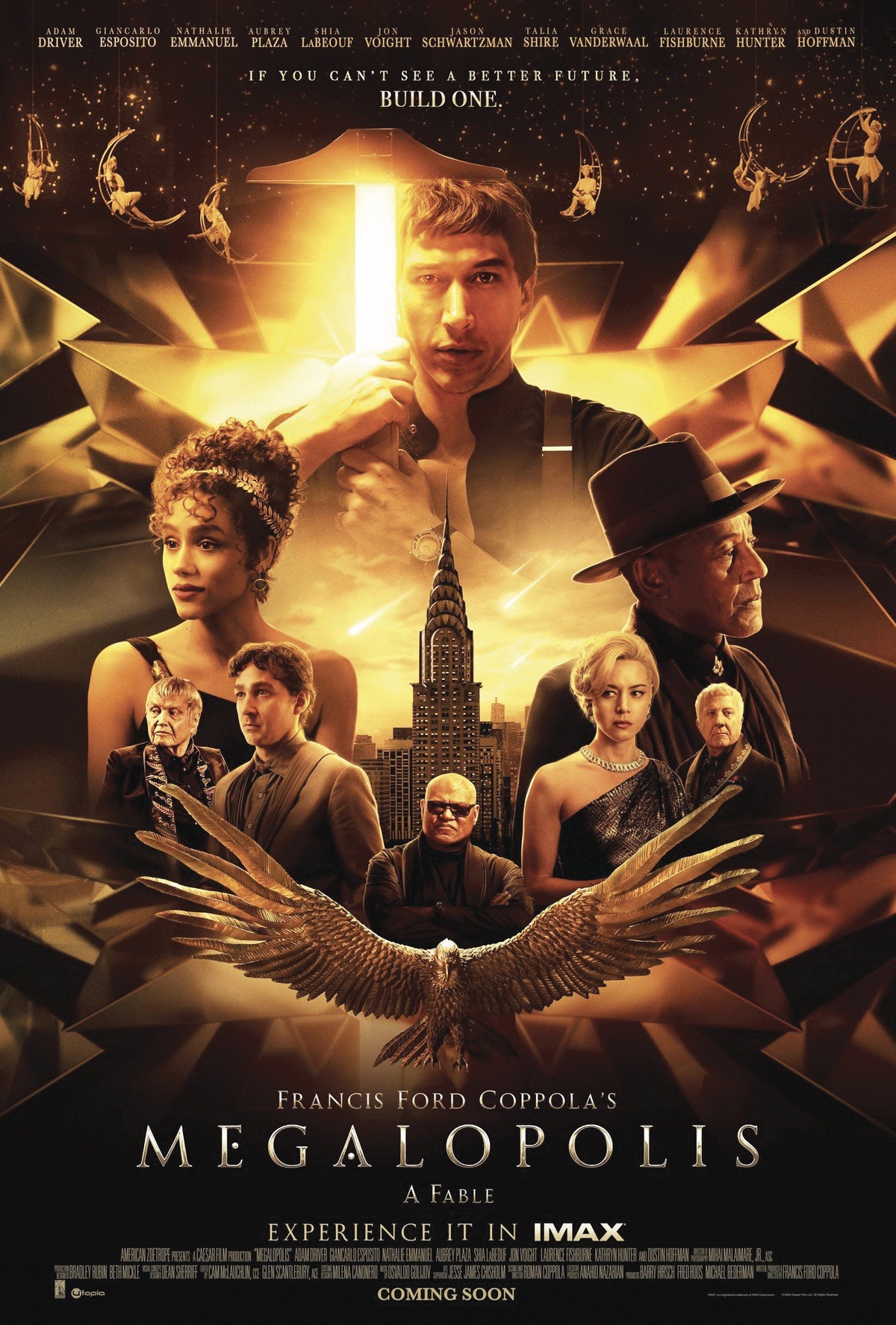The problem with passion projects is they tend to go stale if held on too long. I am as old as Megalopolis is. In different publications, Francis Ford Coppola would give commentaries about how far along he was. But no film came about…until now. However, I am sad to say that this is not a misunderstood masterpiece; to put it mildly, ambitious but flawed.

To summarize the plot, welcome to New Rome in the year whatever. If there has been anyone who has thought about the Roman Empire the most over the last four decades, it’s Francis. Based on a conspiracy to overthrow the Republic in 63 BCE, our hero isn’t Cicero (who is a mayor, played by Giancarlo Esposito). It is Cesar Catalina, transformed from a general and politician into a Randian architect. Cesar views a society in decline; his task is to resurrect it before it is too late, but others wish to block or destroy him.
Besides the mayor, his former girlfriend Wow Platinum( yes, that is her name) joins forces with his brother Clodio (an absolutely unhinged Shea LaBeouf) to take Cesar and their uncle Crassus (Jon Voight) down. Whereas this could have been a rather interesting take on a real-story told from the perspective of now, we are treated to Hamlet’s death soliloquy in an opening scene and Latin being projected on light-up score boards. Such esoteric things aren’t usually a deterrent for myself, but mainstream audiences won’t have patience. With all these pretensions, you would think Coppola would just let us extrapolate. But in another scene, a statue of Lady Justice slumps over and leans tired on a building. All while another character says “injustice.” Do you trust your viewers or not, Francis?
Everything that has been stated, dear readers, may come off as I hated the movie, which is not true. For all its flaws, Megalopolis doesn’t commit the cardinal sin of being boring. Most films as audacious as this never are. I would put this with Darren Aronofsky’s mother!, another film which I have never watched again since its theatrical run but has stuck with me just the same. Both films work so hard to convey feverish ideas through symbolism and allegory, using CGI not to make a blockbuster but to augment fables. But that is a bridge too far for some.
There is a scene halfway through the movie where the hero has lost his ability to stop time (don’t ask) while he is standing on a girder. His conversation with Mayor Cicero’s daughter and their realization of budding love helps to bring back his power and restore him. The soft hues and feeling of weightlessness made me dizzy with anticipation. In that moment I wanted to point to the screen and say that’s it, Coppola. We don’t need to be bogged down with side plots and deviations. Other scenes like the Madison Square Circus Maximus had the same effect, lavish sets and grand spectacle on par with Apocalypse Now and his Dracula.
Just too many disparate tones step on each other; the self-seriousness of Adam Driver, Esposito and Natalie Emmanuel, and the zany antics of LaBeouf, Voight and Aubrey Plaza. And there is no time to get into wasted actors like Dustin Hoffman and Lawrence Fishburne, the later of whom is Catalina’s driver and narrates the movie inexplicably. Personally, I can listen to him read the phone book and it would be fine. Dare I say, Coppola has a mini treatise on our obsession with putting ‘virginal’ pop stars on a pedestal only to knock them down; a concept like the failing satellite, which should have been dropped. In the end, Coppola’s real crime is that he can’t solve any of society’s ills. He only offers up Marvel logic, a magic alloy that doesn’t exist. When what we need is a voice, Coppola just wants us to listen only to have nothing to say.



